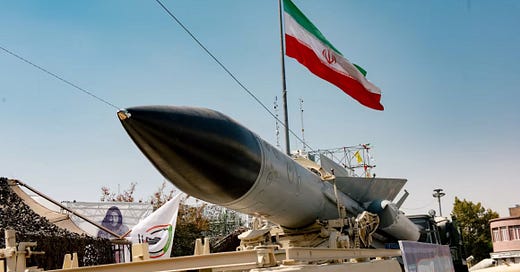The misguided MAGA isolationists
The vast majority of Republicans support Israel and don’t want Iran to have a nuclear weapon.
An S-200 surface-to-air missile system is on display as heavy weaponry, including ballistic missiles, air defense systems and unmanned aerial vehicles, are showcased during an exhibition. (Photo: Hossein Beris/Middle East Images)
The press is full of reporting on the “MAGA civil war” over Iran. The irony? There never was one.
It is notable is that the loudest isolationists lost the debate. It’s worth considering how they misread the historical moment, the views of most Republicans, and above all President Trump.
Start with the threat and the mission. Like leftists after Vietnam, the new-right isolationists see every U.S. military intervention as a slippery slope to disaster. Instead of Vietnam Syndrome, they suffer from Iraq Syndrome: Every U.S. intervention will turn into a quagmire of “nation-building,” or even catastrophe.
“The first week of a war with Iran could easily kill thousands of Americans,” wrote Tucker Carlson on June 4. “It could also collapse our economy, as surging oil prices trigger unmanageable inflation. Consider the effects of $30 gasoline.”
Citing Russia, China and the BRICS bloc, Carlson wrote, “an attack on Iran could very easily become a world war. We’d lose.”
It’ll be “another endless war,” warns Sen. Elizabeth Warren, illustrating that the podcaster right and progressive left increasingly agree on the virtue of American retreat, cowardice and isolationism.
Wars are unpredictable and always come with risks that must be contemplated. Before the Saturday “Midnight Hammer” mission, Israel is winning this fight without regional, much less global, escalation. Iran has fired back at Israel, with decreasing missiles by the day, while Russia and China steer clear. Now, the Iranian response is further weakened and inieffective.
“Military conflict is not a solution,” Chinese President Xi Jinping said last week in anticipation of an American air strike on the Iranian nuclear facilities, apparently indicating China would not get involved.
The isolationists are unwilling to make distinctions and treat each intervention on its own terms. In Iran’s case, no one is talking about putting U.S. troops on the ground or a military occupation. Nor is anyone asking the U.S. to do the heavy lifting or take the biggest risk.
“This is the dirty work that Israel does for all of us,” German Chancellor Friedrich Merz said Tuesday.
The U.S. mission added aerial firepower that Israel doesn’t have — and that America has resisted selling — to destroy buried nuclear sites. The U.S. isn’t starting a war but trying to finish it sooner by neutralizing a nuclear threat from a regime that chants “Death to America!”
Iran’s Ayatollah Ali Khamenei resisted Trump’s terms leading up to the strike and said, “Any U.S. military intervention will undoubtedly cause irreparable harm to them.”
That recycled his threat from before Israel’s attacks, but it is clear he can’t make good on it. With depleted stocks of missiles and launchers, Iran is a far less credible opponent. Israel’s successes strengthened the case for a U.S. strike.
A uranium-enrichment plant at Natanz has been a focus of international anxiety over Tehran’s nuclear work. (Photo: Vahid Salemi/AP)
Another difference with Iraq is that Iran actually had — prior to the B-2 strikes — an advanced nuclear program, far beyond any civilian purpose. There was no uncertainty on this point, as the International Atomic Energy Agency has documented. The only debate is whether Iran, on the precipice of a nuclear breakout, was already weaponizing or merely threatening to do so at a time of its choosing. But does anyone now think Iran would have held off, if left with its enrichment at Fordow intact?
The real endless war is the one Iran has waged against the West since 1979. It has kidnapped and killed over a thousand Americans and pledged to do worse. Nukes, along with the ICBMs Iran is pursuing to bring the U.S. in range, would be the theocrats’ ticket to escalate without consequence.
Gen. Erik Kurilla, the top U.S. commander in the Middle East, told Congress on June 10 that Israel had weakened Iran.
“There has rarely been a time with greater opportunity to protect national interests [in the Middle East], but only if we have the courage,” he said.
Carlson now labels Trump “complicit” and urges the U.S. to “drop Israel,” which seems to be Carlson’s overriding priority. Another podcaster calls for Trump’s impeachment. Their fellow travelers warn that U.S. action would split the MAGA base, but in the real world Trump supporters seem to be rallying behind the President, leaving the Putin-loving isolationists behind.
Carlson had become irrational even before being fired by Fox News for what were said to be his false claims of election fraud by the Democrats in collusion with China. Reports the last few days appear to partially exonerate Carlson, but there remains the stigma of his inexplicable embrace of former KGB operative and Russian thug turned president, Vladimir Putin, as some sort of saintly voice of sanity in a world of chaos.
The now self-made podcaster represents a faction on the right that is against American involvement in the Middle East, regardless of our interests. Despite his rhetorical embrace of these voices during his third presidential campaign, Trump’s approach to the Middle East has been very competent. He has stood by Israel, continued to position the United States against Iran and has not taken American military action off the table.
Most Republicans like and support Israel from long cultural, democratic and strategic affinity. They also understand the danger from a nuclear Iran. A J.L. Partners survey finds “MAGA Republicans” support the U.S. strikes on Iran by more than 4-to-1. A poll by Gray House finds 83% of Trump voters support Israel’s strike and 73% say Iran can’t be trusted to honor an agreement — a fair conclusion from the IAEA reports on 20 years of Iranian nuclear deception, lies and coverups.
Vice President JD Vance, who has long courted MAGA’s isolationists, explained in an X.com post last week why Trump “may decide he needed to take further action to end Iranian enrichment.” He seemed to know which way the White House wind was blowing.
President Trump sees himself as a peacemaker, but that is no contradiction with wanting to deny a nuclear bomb to a theocratic Iranian regime. On that point he has been consistent since before he entered politics.
The inconsistencies lie with the isolationists so traumatized by Iraq and Afghanistan that they would let a revolutionary regime go nuclear in a misguided name of peace that could not last had Iran been allowed to achieve a nuclear weapon.






